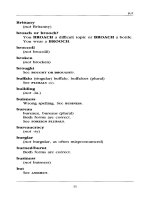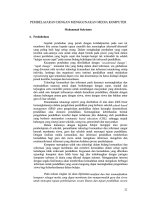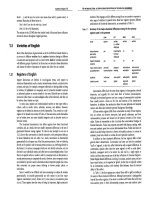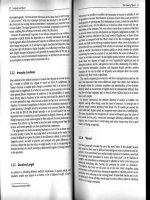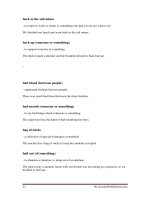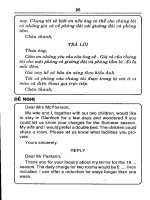Big english plus 4 PB
Bạn đang xem bản rút gọn của tài liệu. Xem và tải ngay bản đầy đủ của tài liệu tại đây (31.3 MB, 165 trang )
Scope and Sequence
Unit
1 Kids in My Class
pp. 4–19
2 Our Schedule
Vocabulary
Structures
Appearance: blonde, curly, dark, glasses, light,
short, straight, tall, wavy
Chris is (taller) than Tom.
Mary’s backpack is heavier than Kim’s.
mine/yours/his/hers/ours/theirs
Personality: clever, friendly, funny, serious,
shy, heavy
Activities: eat out, go on holiday, go to a
wedding, go to the dentist, have a guitar
lesson, visit my grandparents
Expressions of frequency: every, once,
three times/twice a week/year
pp. 20–35
3 Food Around
the World
Food: cereal with milk, chicken curry, lamb
meatballs, noodle soup, paella, porridge,
steamed buns, toasted cheese sandwich,
watermelon
This fabric is more beautiful than that one.
The blue shirt is better/worse than the red one.
How often do you go to the dentist? Once a week.
Where is (she) going tonight? She’s visiting her grandparents.
He’s going to take us to the beach.
Is it going to be wet? Yes, it is./No, it isn’t.
They aren’t going to visit her.
What would you like? I’d like noodle soup, please.
Would (he) like some watermelon? Yes, he would./No, he wouldn’t.
Can I sit down? Yes, you can./No, you can’t.
Let’s go to that place over there.
Should we buy some food here?
pp. 36–51
Checkpoint
Units 1–3
Units 1–3 Exam Preparation
pp. 56–57
pp. 52–55
4 How Do You Feel?
pp. 58–73
5 Weird and Wild
Animals
Health problems: allergies, cold, cough,
cut, fever, headache, sneeze, sore throat,
stomachache, toothache
(You) should/shouldn’t go out.
They take good care of themselves.
myself/yourself/himself/herself/ourselves/themselves
Remedies/Causes: eat too many sweets, go
to the nurse, put a plaster on it, take some
medicine, stay in bed, stay up late
Should we eat? Yes, we should./No, we shouldn’t.
They could call the police.
Animals: Andean condor, Andean flamingo,
angler fish, black rhino, chimpanzee (chimp),
coconut crab, tarsier, Tasmanian devil, volcano
rabbit
How many (chimpanzees) were there 100 years ago? There were
more than one million. But now there are only about 200,000.
Why are chimpanzees endangered? They’re endangered because
people are destroying their habitat.
destroy, endangered, kill, polluted
They could/couldn’t swim.
When was the safari?
Past and present activities: cook in a
microwave, have a mobile phone, have electric
lights, listen to an mp3 player, travel by car,
wash clothes in a washing machine
Did people have (telephones) in 1950? Yes, they did.
Did (your dad) go to school by car when he was a child? No, he
didn’t. He went to school by bus.
My grandad used to walk to school. He didn’t use to ride a bike.
Did people use to listen to mp3 players? No, they didn’t.
pp. 74–89
6 Life Long Ago
pp. 90–105
cooked on a coal stove, had a phone with an
operator, had oil lamps, listened to the radio,
travelled by horse and carriage
Were you swimming? Yes, I was./No, I wasn’t.
She wasn’t sleeping at eleven o’clock.
keep in touch, transportation
Checkpoint
Units 4–6
7 Special Days
Special Days: Earth Day, Father’s Day,
Midsummer’s Day, my parents’ anniversary,
New Year’s Eve/Day, School Sports Day
Party phrases: give/get presents or a card, have
a party, watch a parade, watch fireworks, wear
different clothes
pp. 112–127
8
Units 4–6 Exam Preparation
pp. 110–111
pp. 106–109
Hobbies
Hobbies: basketball, chess, coin collection,
doll collection, music, shell collection, toy car
collection, video games
pp. 128–143
When are (you) going to watch a parade? We’re going to watch a
parade on New Year’s Day.
Is (he) going to give presents? Yes, he is.
I cleaned my room because I’m going to share it with my cousin.
(Laura) is a good (chess player). Yoko is a better chess player than
Laura. Alex is the best chess player in the class.
I’m good at video games. She’s bad at chess.
The red tablet is more interesting than the blue one. It’s the most
interesting of all.
9 Learning New
Things
Talents: bake a cake, build a robot, dance like
a hip-hop artist, draw comic books, make a
website, play badminton, play the guitar, sing
like a rock star, snowboard, speak Chinese
I’ll put the shopping away and I’ll take your bags!
pp. 144–159
Checkpoint
Units 7–9
pp. 160–163
Wordlist and verb list pp. 166–169
Do you know how to play the piano?
What would (she) like to learn how to do? She’d like to learn how
to sing like a rock star.
What does she think of baking cakes? She thinks it’s boring.
Units 7–9 Exam Preparation
pp. 164–165
CLIL/Culture
Science: Twins, triplets and quadruplets
exactly, fingerprint, fraternal, identical, look like, rare,
relationship, survive
Writing
Parts of a
Paragraph
Phonics
ear, air
dear, fear, hear, near, year
Values
Be considerate
to others.
I can…
…make comparisons.
…describe people.
…talk about twins, triplets and quadruplets.
chair, fair, hair, pair, stairs
Around the World: Beards and moustaches
…write a paragraph.
category, hairstyle, manly, prehistoric, shave
Social Science: Advertising
Sequence Words
ir, ur
bird, girl, sir, shirt, skirt
advertisement, attractive, billboard, bright, catch your
eye, character, jingle, product, slogan, tool, tune
Practise good
habits.
…talk about what people do/are going to do and
where they go at different times.
…say how often people do things.
curl, fur, hurt, surf, turn
…talk about adverts and how they work.
Around the World: Unusual habits
librarian, weird
Science: Healthy eating
balanced diet, dairy fat, grains, protein, salty, sugary,
wholemeal
Conjunctions:
because and so
le, el, al, il
apple, bubble, uncle
Choose
healthy foods.
…talk about what people eat.
…make polite requests.
camel, towel, travel
…talk about a balanced diet.
Around the World: School lunches
local, medal, sandals
…find and use because and so.
canteen, filling, lunch box, maize, organic, risotto, tuna
April, pencil, pupil
Science: Germs
Using Commas
kn, wr
bacteria, disease, enemy, fever, fungi, germ, malaria,
microscope, protect, protozoa, spread, virus, vomit
knee, knight, knock, knot,
know
Around the World: Home remedies
wrap, wreck, wrist, write,
wrong
cure, ease, herbal, massage, painkiller, relax, stress,
vinegar
Science: Endangered animals
End Marks
ph, wh
cave, endangered, fur, in the wild, pond, predator, protect,
trap
dolphin, elephant,
phantom, phone, photo
Around the World: Dragons
whale, wheat, wheel,
when, white
evil, extinction, magical, mythical
Maths: Multiplication
Speech Marks
ge, dge
average speed, distance travelled, multiply, number of,
per hour
age, cage, large, page,
sponge
Around the World: Traditional cultures
badge, bridge, edge, fridge,
hedge
dialect, herd, basic necessities, nomadic, running water,
tundra
Geography: World festivals
Emails
ue, u_e, ure
Don’t spread
germs.
…talk about illnesses and health problems.
…ask for and give advice and make suggestions.
…talk about different kinds of germs.
…use commas correctly.
Protect
endangered
animals.
…talk about animals and why some are
endangered.
…ask questions and talk about abilities.
…use end marks correctly.
Solve
problems.
…talk about the past and the present.
…talk about what people used to do.
…calculate average speed.
…use speech marks correctly.
Celebrate
traditions.
…talk about special days and dates.
…talk about the past and the future.
attraction, celebrate, feast, fight, glacier, powder, take
place, torch, unusual
blue, glue, true
cube, cute, duke, huge
…talk about world festivals.
Around the World: Leap years
nature, picture, treasure
…write an email.
propose marriage, superstition
History: Hobbies from the past
Informal Letters
y, igh
by, fly, my, sky, try
creativity, croquet, embroidery, employers, handmade,
imagination, insect, needle, net, sewing, spare time,
thread
Be a good
sport.
…talk about people’s hobbies.
…make comparisons.
…talk about hobbies in the past.
fight, high, light, night,
right
…write an informal letter.
Around the World: Unusual museums
coral, dust, lock of hair, marine life, potter
Science: Body movement
Reviews
ew, ey, e_e
Learn new
things.
…talk about things people know how to do.
bone, brain, contract, flexible, joint, motion, muscle,
nerves, organs, precision, relax, skeleton, support
dew, few, new, stew
grey, hey, prey, they
…give opinions and make offers and quick
decisions.
Around the World: Extraordinary kids
eve, gene, these
…describe how my body moves.
effort, legend, professional, talent
…write a review.
Unit
1
Kids in My
Class
2
1
Listen, look and say.
Class
Yearbook
1
2
Trish is tall and
has got long light
brown hair. She
plays the flute.
Darren is short. He
has got straight
black hair and
glasses. He’s shy.
3
4
Sylvia has got
brown hair. She
carries a bright
pink backpack.
Natalie has got
wavy blonde hair.
She’s clever and
likes to read.
5
6
Brian has got
dark brown hair
and glasses. He’s
serious.
Larry has got light
brown hair. He’s
friendly and
very funny.
3
2
Listen, find and say.
4 Unit 1 vocabulary (appearance/personality traits)
3
Play a game.
4 5
4
Listen, look and sing. Which girl is Marie?
Who’s That Girl?
It’s the first day of school.
We’re back in our classes.
Everybody looks different
And I’ve got new glasses!
Who’s that girl
Standing over there?
She’s taller than me.
She’s got curly dark hair.
In my class are the same friends I know.
But we all change. We all grow. (x2)
It’s the first day of school
And I’m back in my chair.
Everybody looks different.
Now I’ve got straight hair.
Who’s that girl?
Oh, wait, that’s Marie!
Last time I saw her,
She was shorter than me!
Chorus
5
Look at the people in 1 and say True or False.
1
Sylvia has got brown hair. 2 Natalie wears glasses.
4 Brian is serious.
6
3 Larry is shy.
5 Trish plays the saxophone. 6 Darren is tall.
Ask and answer about people in
your class.
She’s tall and has got long
black hair. Who is she?
It’s Sarah.
Do people in the same family always look the same?
Do they sometimes look different?
song/vocabulary (same/different) Unit 1 5
Story
7
7
Listen and read. Who’s taller? Amanda or Christina?
u!
o
Y
e
k
i
L
t
s
She’s Ju
Her name’s Amanda.
She’s got curly dark hair.
There’s a new girl in
our class.
AW Photo 1.13-1.18
Oh, really? What’s she like?
1
Christina tells her dad about the new
girl at school.
Yes... but my hair is curlier than hers.
And her hair is longer than mine.
3
6 Unit 1
But Christina and Amanda are
different in some ways, too.
Just like yours!
2
Christina and the new girl have
got some things in common.
Is she tall?
4
No, she isn’t. I’m taller than her.
Amanda is shorter than Christina.
Is she nice?
Just like you!
I’m clever and nice
but I’m not shy!
Yes, she’s nice. And
she’s clever, too. But
she’s also a bit shy.
5
8
Christina likes her new classmate.
6
Christina is definitely not shy!
Copy the chart. Then read and ✔ or ✘.
Christina...
1
Amanda...
has got curly dark hair.
2 has got long hair.
3 is tall.
4 is nice and clever.
5 is shy.
Think of a friend. Explain how you are the same
and how you are different.
reading Unit 1
7
Language in Action
8
9
Listen and look at the sentences. Help Sam and Christina make more.
shorter
darker
Chris is
longer
taller than
Mary’s backpack is
brighter
.
.
John’s
Kim’s
heavier than
.
Copy the chart. Then complete.
+er
1
?
light
11
Tom
shorter than
Kevin’s hair is
10
smaller
y +ier
straighter
2
curly
4
?
double consonant + er
3
wavier
?
5
?
?
red
bigger
6
?
Look at the picture. Make sentences using than.
heavy
1
light
long
short
tall
Mia
Juan is ? Mia.
2 Mia is ? Juan.
3 Mia’s hair is ? Juan’s.
4 Juan’s hair is ? Mia’s.
5 Juan’s backpack is ? Mia’s.
8 Unit 1 language practice (Chris is taller than Tom.)
Juan
Language in Action
12
13
Read. Then complete the sentences.
I
my
mine
she
her
hers
you
your
yours
we
our
ours
he
his
his
they
their
theirs
My sister’s hair is longer than my hair.
My sister’s hair is longer than mine.
My brother’s hair is curlier than your hair.
My brother’s hair is curlier than 1 ? .
My hair is straighter than his hair.
My hair is straighter than 2 ? .
Our class is bigger than their class.
Our class is bigger than 3 ? .
Make new sentences.
hers
1
mine
ours
yours
My sister is younger than your sister.
2 His book is heavier than her book.
3 Leyla’s hair is shorter than my hair.
4 Their car is bigger than our car.
14
Make sentences.
1
my sister/tall/yours
2 his backpack/heavy/mine
3 Leyla’s legs/long/his
4 my eyes/dark/hers
5 their house/small/ours
15
Describe things in your class with a partner.
Lisa’s glasses are
darker than Kim’s.
Hakan’s backpack is
brighter than John’s.
language practice (My sister’s hair is longer than mine.) Unit 1 9
Content Connection
16
Science
Look at the people in your class. What’s the same? Find and make
sentences. Are there any twins?
eye colour
hair
hair colour
height
nose
Paulo and Juan have
got the same hair!
10
17
Listen and read. What are two types of twin?
CONTENT WORDS
exactly fingerprint fraternal identical
look alike rare relationship survive
Twins
1
2
3
4
5
10 Unit 1
and
More!
Are your brothers and sisters older than you or younger than you?
Sometimes brothers and sisters are exactly the same age. This happens
when a mother has more than one baby at the same time. If there are two
babies at the same time, we call them twins. Triplets means three babies
and quadruplets means four babies!
One out of every 32 births is a pair of twins. One birth in every 625
is triplets, and quadruplets (four babies) and larger groups are quite rare.
Only 1 in every 9,000 births is quadruplets. This is because it’s more
difficult for quadruplet babies to survive.
Do twins always look the same? The answer is no. There are two types of
twin. Identical twins look exactly alike but other twins are called fraternal:
they don’t look alike. Fraternal twins are much more common than identical
twins: only 30% of all twins are identical and 70% are fraternal. In larger
birth groups, identical babies are very rare. For example, only 8% of triplets
are identical and 92% are fraternal. And there is only a 1% chance of
identical quadruplets, so more than 99% of them are fraternal.
So are identical babies completely identical? Again, the answer is no.
The hair, eyes, character and even foot size for identical babies can be the
same. However, they’ve got different fingerprints. Also, sometimes twins
can be like a mirror, for example when one twin is left-handed and the
other twin is right-handed.
In 2010, researchers in Padova, Italy, showed images of twins growing
inside their mother. These images tell us that twins really do have a special
relationship. The twins touched each other more than they touched
themselves. These little brothers and sisters begin to love each other even
before they are born.
18
Copy the chart. Read quickly and complete.
Number of babies
2
3
6
19
?
Name
Number of births % identical % Fraternal
2
1 out of 32
70%
?
?
3
4
5
8%
?
?
?
7
quadruplets 1 out of 9,000
Less than 1%
?
1
Look at 17 and say True or False. Correct the sentences that are false.
1
Twins, triplets and quadruplets are the same age.
2 There are more quadruplets than triplets.
3 Identical twins are more common than fraternal twins.
4 Identical twins aren’t always exactly the same.
5 Identical twins have got the same fingerprints.
6 Twins growing inside their mothers often touch each other.
What are some good and bad things about having
an identical twin?
PROJECT
20
Do a class survey about brothers and sisters. Ask and answer to complete
the chart.
Number of brothers or sisters
Number of pupils
% of all pupils in class
none (only child)
one
two
three
four or more
twins, triplets or quadruplets
21
Look at 20. What is more common in your class? What is less common?
Make three sentences.
One brother or sister is more common than three brothers or sisters.
content connection (twins, triplets and quadruplets) Unit 1 11
Grammar
12
22
Listen and read. Which T-shirt does Ryan decide to buy?
Ryan and Jenny are shopping.
23
Ryan:
I can’t decide which T-shirt to buy. This blue
one’s OK but is the white one nicer?
Jenny:
I think the blue T-shirt is more interesting
than the white one. Look, the fabric is
better, too.
Ryan:
Yes, you’re right.
Jenny:
And it’s your colour. You look more handsome in it!
Ryan:
Yes, it’s perfect! Let’s see how much it is… Oh! Um... I think I’ll get
the white one.
Jenny:
But why?
Ryan:
Because the blue T-shirt is also more expensive!
Look at 22. Complete the charts.
interesting
The blue T-shirt is 1 ? than the white one.
handsome
You look 2 ? in the blue T-shirt.
expensive
The blue T-shirt is 3 ? than the white T-shirt.
But...
24
good
The fabric is 4 ? .
bad
These jeans are worse than those jeans.
Look at 23. Compare using the words in brackets.
1
Adrianna is ? her sister. (beautiful)
2 Good idea! I think you’re ? I am! (intelligent)
3 My friend Harry is ? everyone else in the class. (popular)
4 Selda’s Maths grade is ? mine. (good)
5 Triplets are ? quadruplets. (common)
6 This place is awful! Their pizza is ? their burgers! (bad)
12 Unit 1
Grammar
25
Look and read. Then make sentences.
Motorbike:
€400
Safety:
✰✰✰
Comfort:
✰✰
cheap:
The motorbike is ? the car.
2 expensive:
The car is ? the motorbike.
3 safe:
The car is ? the motorbike.
4 dangerous:
The motorbike is ? the car.
5 comfortable:
The car is ? the motorbike.
6 uncomfortable:
The motorbike is ? the car.
1
26
Look at 25. Make new sentences.
27
Read, ask and answer.
1
Car:
€30,000
Safety:
✰✰✰✰✰✰
Comfort:
✰✰✰✰✰
difficult – Maths or History?
2 interesting – board games or computer games?
3 a good pet – a cat or a dog?
4 healthy – a good breakfast or a good dinner?
5 exciting – books or films?
6 funny – cartoons or comics?
Which is more difficult: Maths or Science?
I think Maths is more difficult than Science.
I don’t agree. I think Science is more difficult than Maths!
28 Look at 27. What do you think? In your notebook, write six sentences.
grammar (The jeans are more expensive than the skirt.) Unit 1 13
Culture Connection
Beards
1
Around the World
and
Moustaches
This issue of Fun Facts looks at beards and moustaches and a very strange
competition. How many of these things did you know?
FACT Many Europeans believe a beard is very manly but in Asia and South America,
beards are less popular.
FACT Scientists believe prehistoric men had beards because a man with a beard is
scarier than a man without a beard!
FACT In ancient Greece, beards were very popular because Greeks thought
men looked cleverer with a beard. But Alexander the Great changed this.
Alexander was worried about enemies pulling his men’s beards in battle, so
all his men shaved!
2
Today, beard fashions still come and go. In 1990, a group of men in Germany
didn’t care about fashion but they loved strange beards and moustaches.
29 Where are these hairstyles from? Look, guess and match. Then compare
with the class.
England
France
a
Jamaica
Japan
b
c
d
30 Which hairstyle do you like? Discuss with a partner.
I like picture b because I love colours.
I like picture c more because...
31
14 Unit 1
Read the article quickly. What’s it about? Look and choose two.
a Beards in history
b
Women’s hairstyles
c An interesting competition
d
Life in Greece
They wanted to have better or stranger beards than anybody else.
They started a competition to compare their beards and moustaches.
Soon people came from countries all over the world such as
Switzerland, Norway and the United States. Now there’s a World Beard
and Moustache Championship every two years.
3
There are sixteen different categories of beards and moustaches
at the Championship. The English Moustache is long and goes
out to the sides. The Dalí Moustache is named after the famous
Spanish painter Salvador Dalí. It’s long and points straight up.
The Verdi category gets its name from Italian composer Giuseppe
Verdi. This style has a straight beard and a curly moustache. The
Freestyle Beard is even funnier and more interesting! Competitors
in this category don’t have to follow specific rules. Their beards
and moustaches can be any shape or style they like!
4
The competition takes place in a different country each time. In
the World Beard and Moustache Championship, culture doesn’t
matter but the hair on your face does!
13
32
Listen and read. Then choose the correct answer.
1
Beards are more popular in...
a Europe.
b South America.
2 Alexander the Great didn’t like beards...
a because people looked
cleverer with them.
b because they were a
problem in battles.
3 Who started the World Beard and Moustache Championship?
a A group of Germans.
b Some men from Norway
and Switzerland.
4 The beards and moustaches at the Championships...
a have famous names.
b all copy the same style.
5 The Championships...
a are in a different country each time. b are always in Germany.
33
Search for pictures of
interesting hairstyles.
Which styles do you
like and why? Discuss
with a classmate.
Has anyone in your family got a
beard or a moustache? Do you
like it? Why/Why not?
culture connection (beards and moustaches) Unit 1 15
Writing
Parts of a Paragraph
34 Read. Then find the title, topic sentence, detail sentences and
final sentence.
A title says what you are going to read about.
A topic sentence gives the main idea of a paragraph.
Detail sentences give us more information.
A final sentence talks about the subject in a different way.
My Best Friend
My best friend’s name is Anita.
She’s taller than me and her hair is longer than mine. Anita is clever and
she’s funny, too. We like playing computer games at the weekend.
I’m happy to have a friend like Anita.
35
Read the sentences and say title, topic sentence, detail sentence or
final sentence.
1
She is very nice and a lot of fun.
2 I’m always happy to see Aunt Elsie.
3 She likes making biscuits with my sister and me.
4 My favourite aunt is Aunt Elsie.
5 My Aunt Elsie
6 She also likes playing games with us.
36 Look at 35. Order the sentences to make a paragraph.
Writing Steps
37
Write about a friend or relative.
Think of a friend or relative.
3 Write a title.
2 Make a list of what they are like
and why you like him/her.
5 Write three detail sentences.
4 Write a topic sentence.
1
6 Write a final sentence.
16 Unit 1
ear, air
Phonics
15
38 Listen, read and repeat.
1
ear
2
air
16
39 Listen and find. Then say.
hear
chair
17
40 Listen and blend the sounds.
f-ear
fear
2 y-ear
year
3 h-air
hair
4 p-air
pair
5 f-air
fair
6 d-ear
dear
7 n-ear
near
8 s-t-air-s
stairs
1
18
41
Read aloud. Then listen and chant.
A boy with big ears and fair hair,
Hears the twins on the stairs.
A boy with big ears and fair hair,
Hears the twins sit on their chairs.
phonics (ear, air) Unit 1 17
Values
Be considerate to others.
20
42
Listen and complete the sentences.
dropped
1
first
help
turn
You can have a ? .
3 You can go ? .
2 Can I ? you?
4 You ? something.
43 Practise being considerate with a partner.
You can go first.
Thank you!
PROJECT
44 Make Good Manners award
ribbons. Your teacher can
give them to pupils who are
considerate and have got
good manners.
18 Unit 1
Good
Manners
Review
45 Complete the dialogue.
better blonde clever darker different
he more serious taller yours
A: Is that your brother?
B: Yes, that’s Max. We’re not the same, we’re very 1 ? . He’s more 2 ? than I am.
He’s quite shy.
A: Are you 3 ? playful than he is?
B: Absolutely! And I’m 4 ? than 5 ? is.
A: Yes, he’s shorter and his hair is 6 ? than 7 ? .
B: Yes. I’ve got 8 ? hair. His is brown.
A: Is he 9 ? ?
B: Yes, he’s very good at Maths. But I’m 10 ? at sport!
46 Make cards with the words below. Then play a game.
big
bright
curly
dark
heavy
light
long
short
small
tall
Allie’s hair is longer
than mine.
I Can
XÐmake
comparisons.
XÐdescribe people.
XÐtalk about
twins,
triplets and
quadruplets.
XÐwrite a
paragraph.
review/self-assessment Unit 1 19
Unit
2
21
1
Our
Schedule
Listen, look and say.
2 go on
holiday
1 go to the
dentist
4 visit my
grandparents
3 go to a
wedding
5 eat out
6 have a
guitar lesson
22
2
Listen, find and say.
20 Unit 2 vocabulary (schedules)
3
Play a game.
23 24
4
Listen and sing. Find the nine activities Sam does.
Things We Do!
There are lots and lots of things
That I do every day,
Like go to school, watch a film,
Stay up late and play!
But there are lots of other things
I don’t want to do so much,
,
Like go to the dentist, do the dishes
Make my bed and such.
How often do you do these things?
r?
Every day? Once a week? Once a yea
I take out the rubbish
On Tuesdays before school.
And I feed our funny cat
But I don’t mind – she’s cool.
Chorus
25
5
Listen and complete.
1
2 They ? every winter.
I ? dentist twice a year.
3 She ? with her parents every Friday.
6
4 We ? four times a month.
Look at 1. Ask and answer for you. Use the words from the box.
once *
twice **
three times ***
every day/week/month/year/summer
How often do you
go to the dentist?
I go three
times a year.
What activities should you do once a day? Explain.
song/vocabulary (expressions of frequency) Unit 2 21
Story
27
7
Listen and read. Where is Christina going this weekend?
gs!
n
i
d
d
e
W
f
A Lot o
What are you doing this
weekend, Amanda?
How often do you see
your grandma?
I’m going to my
grandma’s house.
Every Saturday.
1
Christina and Amanda are talking
about their weekend plans.
How about you? What are
you doing this weekend?
I’m going to
my cousin’s
wedding.
2
Amanda sees her grandma once
a week.
Oh! Do you like going to weddings?
No, I don’t because I
have to wear a dress.
3
Christina isn’t happy about her
weekend plans.
22 Unit 2
4
Christina doesn’t like wearing
dresses.
How often do you go to weddings?
Wow! That’s a lot of weddings!
About three
times a year.
I’ve got lots
of cousins!
And a lot of dresses for me!
6
Christina has to go to a lot
of weddings.
5
8
Christina is thinking about all the
dresses she has to wear to her
cousins’ weddings.
Find the mistakes and correct the sentences.
1
Amanda is going to her friend’s house this weekend.
2 Amanda visits her grandma every Sunday.
3 Christina is going to her uncle’s wedding.
4 Christina is happy about her weekend.
5 Christina goes to weddings three times a week.
6 Christina likes wearing dresses.
Do you like wearing different clothes for special
occasions?
Is it good to have lots of cousins? Why/Why not?
reading Unit 2 23
Language in Action
28
9
Listen and look at the sentences. Help Sam and Christina make more.
go to a wedding
is she
Where
She
I
are you
eat out
tonight
doing
?
.
after school
’m having a guitar lesson
?
.
Complete the questions. Then match.
1
11
going
’s visiting her grandparents
What
10
go to the dentist
? are they doing after school?
a She’s going to the library.
2 ? is your sister going?
b They’re going shopping.
3 ? are we going after dinner?
c He’s helping in the school garden.
4 ? is Mr Lee doing after school?
d We’re visiting our grandparents.
Put the words in order. Make questions and answers. Then make your
own to test your partner.
1
he
tomorrow?
2
tonight?
3
eating out
4
going
5
visiting
are
Where
doing
is
What
We’re
town.
on
My family
are
He’s
his
going
next
your parents
in
holiday
weekend.
this summer.
friend
24 Unit 2 language practice (What are you doing tonight? Where are you going this weekend?)
Language in Action
12
Read. Then put the phrases in the word box in order. Start with twice a
day. Then make sentences for you.
twice a
week
every
Thursday
once a
month
three times
a year
every month every spring every Tuesday
once a day three times a week twice a day
twice a year
every
summer
I visit my
grandparents
every month.
What do you do
every month?
13
Answer the questions for you.
1
How often do you go to the dentist?
2 How often do you play sports?
3 How often does your English teacher give tests?
4 How often does your best friend come to your house?
14
Correct these sentences for you.
1
I go to the dentist once a week.
2 My family eat out every weekend.
3 My sister does the dishes twice a year.
4 My grandma makes her bed every winter.
5 I go to a wedding every Saturday.
15
Ask and answer.
What are you
doing this
weekend?
How often do
you eat out?
I’m going to the
park and eating
out on Sunday.
About once
a month.
language practice (How often...? Expressions of frequency) Unit 2 25

